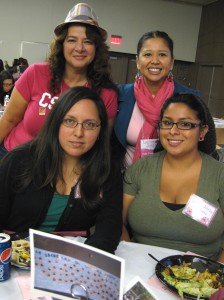On Nov. 5, the annual Latinas Juntas, a mentoring event for Latina students presented by the university’s Career Center took place in the Ballroom of the Loker Student Union. Chicana author Reyna Grande, serving as the keynote speaker, inspired and motivated the participants to succeed at a higher level than they thought possible.

Dr. Monica Rosas-Baines, a psychologist in Student Health & Psychological Services created Latinas Juntas eight years ago with Dr. Denna Sanchez, a psychologist in the Career Center. She also teaches Grande’s debut novel, “Across a Hundred Mountains,” in a class titled “Las Chicanas,” which examines the cultural, social, and political issues that Chicanas face in the United States and the historical and contemporary context of these issues.
“Reyna Grande’s life story serves as an inspiration to our students,” says Rosas-Baines. “She, like many of our students, was the first in her family to attend college. Despite the challenges of coming to the U.S. as an undocumented immigrant and being raised in a dysfunctional home, she persevered and never gave up on her dream of becoming a writer.”
Rudy Rangel, a sophomore majoring in international business/business administration, says that she wanted to participate in Latinas Juntas to learn more about her culture. A peer mentor in the Summer Bridge Program, she realizes the value of a support system for students.
“I learned that there are many students struggling with the same situations and it is easy to cope through problems when someone is there,” she says.

The importance of mentors–including those who share a similar cultural background–is something that Rangel says lets her and her fellow students know they “are not alone. It keeps us motivated to overcome obstacles and do well in education or anything else we may encounter.”
“Latina students who are not first generation but fourth generation or more forget about their culture and need to understand how Latinas got this far with numerous historical movements and achievements,” says Rangel. “Therefore, [culturally sensitive] mentorship plays the role of exploring our past and understanding our present and future.”
Irene Vasquez, chair of the Academic Senate, director of World Cultural Studies, and associate professor and chair of Chicana/o studies, says that she participates in Latinas Juntas every year to enhance her perspective on academic and social support needs of students, particularly Latinas and first-generation college students.
“As a faculty facilitator, the event provides me with the opportunity to evaluate where Latina students are in their higher education pathway,” says Vasquez. “As a faculty mentor, I learn about the challenges Latina women face in the academy.”
“The program encourages Latina students to be self-sufficient and also to nurture and support other women on campus. The bonding experience is a powerful one that creates a safety support network for women professors and students. These are exactly the kinds of programs that first generation female students need.”
Katy Pinto, an assistant professor of sociology who participates in Latinas Juntas as a faculty mentor, underscores the intrinsic value of faculty and staff who can mentor and support students from a shared cultural background.
“As individuals, we hold many social roles, mother, wife, daughter, student, friend and employee,” notes Pinto. “The expectations of these roles are determined by cultural context. For Latino and other minority students, this cultural context can create a conflict. For example, if a good daughter has to put family first, then her role as a student may experience strain if she has doesn’t have time for family activities if she’s supposed to study.
“My family was very supportive of my education, but I hear stories all the time from students who don’t have family support for their education,” she says. “Understanding that sometimes cultural context explains this lack of support is very important if we want to help students.”
During a morning session, President Mildred García greeted the students and welcomed them to Latinas Juntas.
“The comments included in this year’s Latinas Juntas evaluations regarding the presentations by President García and Reyna Grande reflect the profound impact their stories have on our Latina students,” says Rosas-Baines. “Students wrote about how they felt motivated and more confident after hearing about the life journeys of these phenomenal women.”
Because students are encouraged to attend Latinas Juntas throughout their time at CSU Dominguez Hills, Vasquez says that she has seen benefits both to returning participants and the new students they help through peer mentoring.
“The returning students are so thankful for the space to dialogue with other women and [the encouragement they receive] to be successful in higher education,” she says. “New participants appreciate getting advice from [returning] students or faculty members.
Rangel says that her experience with Latinas Juntas has not only nurtured her academic pursuits but has also inspired her to set an example and serve as a role model for other Latina students.
“I appreciate my culture more,” she says. “[Latinas Juntas] helped me to understand that I am a Latina student and proud of it.”
For more information on Reyna Grande, click here.
For more information on Latinas Juntas at CSU Dominguez Hills, click here.